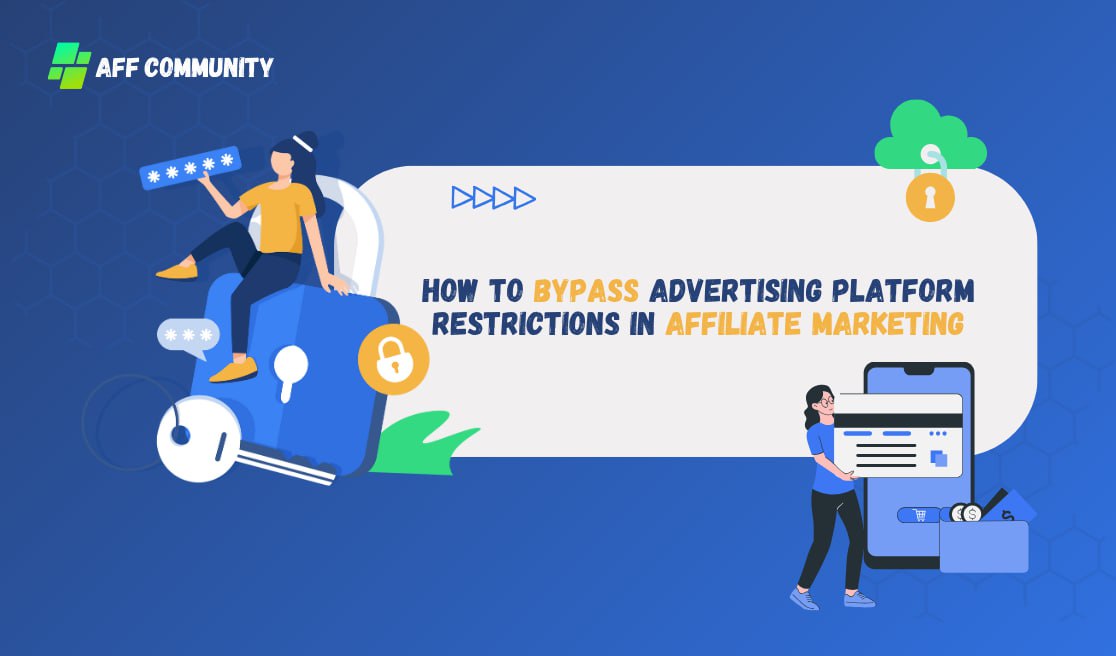How to bypass advertising platform restrictions in affiliate marketing
Affiliate marketing is a dynamic and competitive field that is constantly at odds with advertising platforms. The major players (Google, Facebook, and TikTok) are investing in improving algorithms to detect and block violators. It is especially difficult to promote risky topics such as financial services, dietary supplements, and adult products. In this environment, the ability to bypass restrictions and adapt to new rules becomes critical to the profitability and survival of a business. Losses from account bans can reach tens of thousands of dollars per day.
Want to learn more about how affiliate marketing can bring you good profits? On the blog at AffCommunity, you can find case studies, reviews, and informative articles.
Types of restrictions: three fronts
Restrictions that almost every publisher may encounter are influenced by factors that create complex barriers. They can be divided into three groups.
Geographical barriers
Platforms strictly restrict the display of ads in certain regions, including countries with strict digital advertising laws, high levels of fraud, or low solvency (e.g., Africa, Southeast Asia, and Latin America). To do this, they use detection systems that analyze IP addresses, location data, bank card information, language settings, time zones, and network delays. Modern algorithms identify discrepancies between these parameters with high accuracy.
Thematic restrictions
Many goods and services are prohibited or strictly controlled: gambling (without licenses), dietary supplements with unproven effectiveness, quick-rich schemes in cryptocurrency (HYIP), adult content, risky financial instruments, and goods that violate copyright.
Algorithms recognize prohibited topics, including direct mentions, hints, slang, altered visual images, metaphors, and euphemisms, by analyzing text, images, video, and audio content.
Audience filters
Platforms restrict the display of ads to certain social and age groups. The most obvious example is the ban on targeting minors with adult offers.
However, filters go deeper: they can block ads from being shown to groups with low creditworthiness, users with certain medical diagnoses (for nutra), or in regions with special legal status (e.g., US states with legal and regulated gambling). This involves not only user profile data, but also behavioral analysis: search history, websites visited, activity time, content interaction patterns, as well as cross-checking with government registries and databases (where permitted by law).
The underlying reasons for the tightening of rules
The reasons for the tightening of rules go far beyond concern for users. These include:
- legal risks (fines of up to billions of dollars);
- economic benefits (15-22% increase in advertising prices);
- reputational considerations (data leaks, as in Cambridge Analytica);
- lobbying (geoblocking in iGaming).
In other words, platforms are tightening their rules primarily in their own interests, to increase profits and strengthen control over users.
Typical mistakes made by arbitrageurs: why accounts get banned
Webmasters' mistakes are often related to underestimating the systematic nature of platform protection. These include:
- insufficient infrastructure protection — using public VPNs or shared proxies for multiple accounts;
- templated creativity — repetition of trigger phrases and similar images;
- overcomplicating technology by simultaneously using cloaking, redirect chains, and scripts in a single campaign;
- conservatism in adaptation and ignoring new requirements and browser standards.
These and other mistakes often lead to problems with affiliate marketing in Google Ads and other advertising networks.
Effective workarounds: complexity is the key to success
Workarounds require comprehensive analysis. Infrastructure protection starts with anti-detection browsers (e.g., Dolphin{anty}) and resident proxies to create unique digital fingerprints. Innovations include generating text and images using neural networks (ChatGPT, Midjourney) to bypass algorithms. Technological discipline involves choosing tactics: for sensitive offers, cloaking with a white list of moderator IP addresses; for mass offers, geo-redirection. Constant monitoring includes tracking updates via Semrush and analyzing patent applications from tech giants.
To ensure that your advertising campaigns pass moderation in traffic sources, we recommend using the Money Safe service. This service specializes in creating White Pages.
Strategy for long-term success: from survival to sustainable growth
A long-term success strategy is built on five principles. Risk assessment requires checking the offer for legal issues and a history of blocks before launch. Investments in tools include browser customization and the development of hybrid cloaking systems, where the traffic of checkers is directed to legal sites. Deep data analysis through platforms such as RedTrack allows you to predict profits from users in “gray” regions. Regular experiments with 25% of the budget help test new traffic sources, from LinkedIn ads to voice assistants. Professional networking in communities such as StackThatMoney provides access to relevant case studies and preventive practices.
The future of affiliate marketing: legalization, adaptation, and strategic alliances
The future of affiliate marketing is linked to the legalization of processes. Successful examples (including the promotion of betting in Germany through a partnership with a licensed operator) already prove that the key advantage is not the volume of traffic, but the ability to integrate into the legal framework. By 2027, those who use restrictions as a map to find opportunities, combining technological flexibility, regulatory analytics, and strategic alliances, will prevail. Experience shows that even in the harshest conditions, there are always workarounds for those who are willing to invest in adaptation and non-standard advertising campaigns.




